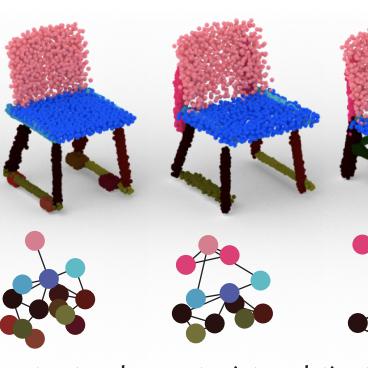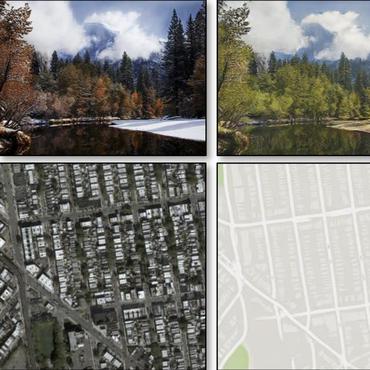Search Results for author: Daniel Ritchie
Found 34 papers, 17 papers with code
Fantastic Questions and Where to Find Them: FairytaleQA – An Authentic Dataset for Narrative Comprehension
no code implementations • ACL 2022 • Ying Xu, Dakuo Wang, Mo Yu, Daniel Ritchie, Bingsheng Yao, Tongshuang Wu, Zheng Zhang, Toby Li, Nora Bradford, Branda Sun, Tran Hoang, Yisi Sang, Yufang Hou, Xiaojuan Ma, Diyi Yang, Nanyun Peng, Zhou Yu, Mark Warschauer
Through benchmarking with QG models, we show that the QG model trained on FairytaleQA is capable of asking high-quality and more diverse questions.
Learning to Infer Generative Template Programs for Visual Concepts
no code implementations • 20 Mar 2024 • R. Kenny Jones, Siddhartha Chaudhuri, Daniel Ritchie
We develop a learning paradigm that allows us to train networks that infer Template Programs directly from visual datasets that contain concept groupings.
R3DS: Reality-linked 3D Scenes for Panoramic Scene Understanding
no code implementations • 18 Mar 2024 • Qirui Wu, Sonia Raychaudhuri, Daniel Ritchie, Manolis Savva, Angel X Chang
We introduce the Reality-linked 3D Scenes (R3DS) dataset of synthetic 3D scenes mirroring the real-world scene arrangements from Matterport3D panoramas.
Open-Universe Indoor Scene Generation using LLM Program Synthesis and Uncurated Object Databases
no code implementations • 5 Feb 2024 • Rio Aguina-Kang, Maxim Gumin, Do Heon Han, Stewart Morris, Seung Jean Yoo, Aditya Ganeshan, R. Kenny Jones, Qiuhong Anna Wei, Kailiang Fu, Daniel Ritchie
Unlike most prior work on indoor scene generation, our system does not require a large training dataset of existing 3D scenes.
Generalizing Single-View 3D Shape Retrieval to Occlusions and Unseen Objects
no code implementations • 31 Dec 2023 • Qirui Wu, Daniel Ritchie, Manolis Savva, Angel X. Chang
Single-view 3D shape retrieval is a challenging task that is increasingly important with the growth of available 3D data.
Explorable Mesh Deformation Subspaces from Unstructured Generative Models
no code implementations • 11 Oct 2023 • Arman Maesumi, Paul Guerrero, Vladimir G. Kim, Matthew Fisher, Siddhartha Chaudhuri, Noam Aigerman, Daniel Ritchie
Deep generative models of 3D shapes often feature continuous latent spaces that can, in principle, be used to explore potential variations starting from a set of input shapes.
Improving Unsupervised Visual Program Inference with Code Rewriting Families
no code implementations • ICCV 2023 • Aditya Ganeshan, R. Kenny Jones, Daniel Ritchie
Programs offer compactness and structure that makes them an attractive representation for visual data.
ShapeCoder: Discovering Abstractions for Visual Programs from Unstructured Primitives
1 code implementation • 9 May 2023 • R. Kenny Jones, Paul Guerrero, Niloy J. Mitra, Daniel Ritchie
The discovered abstractions capture common patterns (both structural and parametric) across the dataset, so that programs rewritten with these abstractions are more compact, and expose fewer degrees of freedom.
Unsupervised 3D Shape Reconstruction by Part Retrieval and Assembly
no code implementations • CVPR 2023 • Xianghao Xu, Paul Guerrero, Matthew Fisher, Siddhartha Chaudhuri, Daniel Ritchie
We instead propose to decompose shapes using a library of 3D parts provided by the user, giving full control over the choice of parts.
CLIP-Sculptor: Zero-Shot Generation of High-Fidelity and Diverse Shapes from Natural Language
no code implementations • CVPR 2023 • Aditya Sanghi, Rao Fu, Vivian Liu, Karl Willis, Hooman Shayani, Amir Hosein Khasahmadi, Srinath Sridhar, Daniel Ritchie
Recent works have demonstrated that natural language can be used to generate and edit 3D shapes.
ShapeCrafter: A Recursive Text-Conditioned 3D Shape Generation Model
1 code implementation • 19 Jul 2022 • Rao Fu, Xiao Zhan, YiWen Chen, Daniel Ritchie, Srinath Sridhar
Results show that our method can generate shapes consistent with text descriptions, and shapes evolve gradually as more phrases are added.
Unsupervised Kinematic Motion Detection for Part-segmented 3D Shape Collections
1 code implementation • 17 Jun 2022 • Xianghao Xu, Yifan Ruan, Srinath Sridhar, Daniel Ritchie
We operationalize this concept with an algorithm that optimizes a shape's part motion parameters such that it can transform into other shapes in the collection.
SHRED: 3D Shape Region Decomposition with Learned Local Operations
1 code implementation • 7 Jun 2022 • R. Kenny Jones, Aalia Habib, Daniel Ritchie
We present SHRED, a method for 3D SHape REgion Decomposition.
Fantastic Questions and Where to Find Them: FairytaleQA -- An Authentic Dataset for Narrative Comprehension
1 code implementation • 26 Mar 2022 • Ying Xu, Dakuo Wang, Mo Yu, Daniel Ritchie, Bingsheng Yao, Tongshuang Wu, Zheng Zhang, Toby Jia-Jun Li, Nora Bradford, Branda Sun, Tran Bao Hoang, Yisi Sang, Yufang Hou, Xiaojuan Ma, Diyi Yang, Nanyun Peng, Zhou Yu, Mark Warschauer
Through benchmarking with QG models, we show that the QG model trained on FairytaleQA is capable of asking high-quality and more diverse questions.
 Ranked #1 on
Question Generation
on FairytaleQA
Ranked #1 on
Question Generation
on FairytaleQA
StoryBuddy: A Human-AI Collaborative Chatbot for Parent-Child Interactive Storytelling with Flexible Parental Involvement
1 code implementation • 13 Feb 2022 • Zheng Zhang, Ying Xu, Yanhao Wang, Bingsheng Yao, Daniel Ritchie, Tongshuang Wu, Mo Yu, Dakuo Wang, Toby Jia-Jun Li
Despite its benefits for children's skill development and parent-child bonding, many parents do not often engage in interactive storytelling by having story-related dialogues with their child due to limited availability or challenges in coming up with appropriate questions.
Learning Body-Aware 3D Shape Generative Models
no code implementations • 13 Dec 2021 • Bryce Blinn, Alexander Ding, R. Kenny Jones, Manolis Savva, Srinath Sridhar, Daniel Ritchie
The body-shape-conditioned models produce chairs which will be comfortable for a person with the given body shape; the pose-conditioned models produce chairs which accommodate the given sitting pose.
Roominoes: Generating Novel 3D Floor Plans From Existing 3D Rooms
no code implementations • 10 Dec 2021 • Kai Wang, Xianghao Xu, Leon Lei, Selena Ling, Natalie Lindsay, Angel X. Chang, Manolis Savva, Daniel Ritchie
We then discuss different strategies for solving the problem, and design two representative pipelines: one uses available 2D floor plans to guide selection and deformation of 3D rooms; the other learns to retrieve a set of compatible 3D rooms and combine them into novel layouts.
The Shape Part Slot Machine: Contact-based Reasoning for Generating 3D Shapes from Parts
no code implementations • 1 Dec 2021 • Kai Wang, Paul Guerrero, Vladimir Kim, Siddhartha Chaudhuri, Minhyuk Sung, Daniel Ritchie
We present the Shape Part Slot Machine, a new method for assembling novel 3D shapes from existing parts by performing contact-based reasoning.
Learning to Infer Kinematic Hierarchies for Novel Object Instances
no code implementations • 15 Oct 2021 • Hameed Abdul-Rashid, Miles Freeman, Ben Abbatematteo, George Konidaris, Daniel Ritchie
Manipulating an articulated object requires perceiving itskinematic hierarchy: its parts, how each can move, and howthose motions are coupled.
The Neurally-Guided Shape Parser: Grammar-based Labeling of 3D Shape Regions with Approximate Inference
1 code implementation • CVPR 2022 • R. Kenny Jones, Aalia Habib, Rana Hanocka, Daniel Ritchie
We propose the Neurally-Guided Shape Parser (NGSP), a method that learns how to assign fine-grained semantic labels to regions of a 3D shape.
ShapeMOD: Macro Operation Discovery for 3D Shape Programs
1 code implementation • 13 Apr 2021 • R. Kenny Jones, David Charatan, Paul Guerrero, Niloy J. Mitra, Daniel Ritchie
In this paper, we present ShapeMOD, an algorithm for automatically discovering macros that are useful across large datasets of 3D shape programs.
Shape From Tracing: Towards Reconstructing 3D Object Geometry and SVBRDF Material from Images via Differentiable Path Tracing
1 code implementation • 6 Dec 2020 • Purvi Goel, Loudon Cohen, James Guesman, Vikas Thamizharasan, James Tompkin, Daniel Ritchie
In this paper, we explore how to use differentiable ray tracing to refine an initial coarse mesh and per-mesh-facet material representation.
PLAD: Learning to Infer Shape Programs with Pseudo-Labels and Approximate Distributions
1 code implementation • CVPR 2022 • R. Kenny Jones, Homer Walke, Daniel Ritchie
Related to these approaches, we introduce a novel self-training variant unique to program inference, where program pseudo-labels are paired with their executed output shapes, avoiding label mismatch at the cost of an approximate shape distribution.
ShapeAssembly: Learning to Generate Programs for 3D Shape Structure Synthesis
1 code implementation • 17 Sep 2020 • R. Kenny Jones, Theresa Barton, Xianghao Xu, Kai Wang, Ellen Jiang, Paul Guerrero, Niloy J. Mitra, Daniel Ritchie
The program captures the subset of variability that is interpretable and editable.
GANHopper: Multi-Hop GAN for Unsupervised Image-to-Image Translation
1 code implementation • ECCV 2020 • Wallace Lira, Johannes Merz, Daniel Ritchie, Daniel Cohen-Or, Hao Zhang
Instead of executing translation directly, we steer the translation by requiring the network to produce in-between images that resemble weighted hybrids between images from the input domains.
Learning to Describe Scenes with Programs
no code implementations • ICLR 2019 • Yunchao Liu, Zheng Wu, Daniel Ritchie, William T. Freeman, Joshua B. Tenenbaum, Jiajun Wu
We are able to understand the higher-level, abstract regularities within the scene such as symmetry and repetition.
Fast and Flexible Indoor Scene Synthesis via Deep Convolutional Generative Models
1 code implementation • CVPR 2019 • Daniel Ritchie, Kai Wang, Yu-an Lin
We present a new, fast and flexible pipeline for indoor scene synthesis that is based on deep convolutional generative models.
Improving Shape Deformation in Unsupervised Image-to-Image Translation
4 code implementations • ECCV 2018 • Aaron Gokaslan, Vivek Ramanujan, Daniel Ritchie, Kwang In Kim, James Tompkin
Unsupervised image-to-image translation techniques are able to map local texture between two domains, but they are typically unsuccessful when the domains require larger shape change.
ScanComplete: Large-Scale Scene Completion and Semantic Segmentation for 3D Scans
no code implementations • CVPR 2018 • Angela Dai, Daniel Ritchie, Martin Bokeloh, Scott Reed, Jürgen Sturm, Matthias Nießner
We introduce ScanComplete, a novel data-driven approach for taking an incomplete 3D scan of a scene as input and predicting a complete 3D model along with per-voxel semantic labels.
An Improved Training Procedure for Neural Autoregressive Data Completion
no code implementations • 23 Nov 2017 • Maxime Voisin, Daniel Ritchie
In this paper, we provide evidence that the order-agnostic (OA) training procedure is suboptimal for data completion.
Learning to Infer Graphics Programs from Hand-Drawn Images
1 code implementation • ICLR 2018 • Kevin Ellis, Daniel Ritchie, Armando Solar-Lezama, Joshua B. Tenenbaum
These drawing primitives are like a trace of the set of primitive commands issued by a graphics program.
Deep Amortized Inference for Probabilistic Programs
1 code implementation • 18 Oct 2016 • Daniel Ritchie, Paul Horsfall, Noah D. Goodman
This paper proposes a system for amortized inference in PPLs.
Neurally-Guided Procedural Models: Amortized Inference for Procedural Graphics Programs using Neural Networks
1 code implementation • NeurIPS 2016 • Daniel Ritchie, Anna Thomas, Pat Hanrahan, Noah D. Goodman
Probabilistic inference algorithms such as Sequential Monte Carlo (SMC) provide powerful tools for constraining procedural models in computer graphics, but they require many samples to produce desirable results.
C3: Lightweight Incrementalized MCMC for Probabilistic Programs using Continuations and Callsite Caching
no code implementations • 7 Sep 2015 • Daniel Ritchie, Andreas Stuhlmüller, Noah D. Goodman
Lightweight, source-to-source transformation approaches to implementing MCMC for probabilistic programming languages are popular for their simplicity, support of existing deterministic code, and ability to execute on existing fast runtimes.












